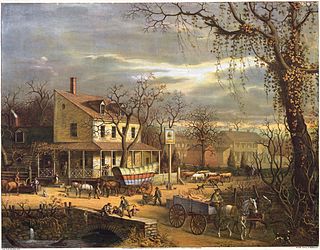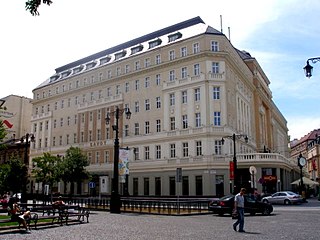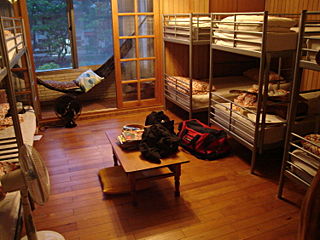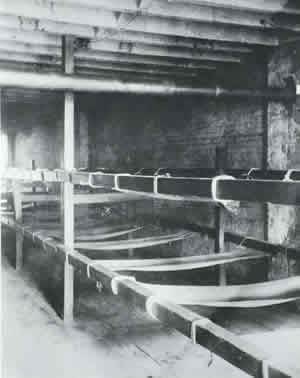Related Research Articles

A hotel is an establishment that provides paid lodging on a short-term basis. Facilities provided inside a hotel room may range from a modest-quality mattress in a small room to large suites with bigger, higher-quality beds, a dresser, a refrigerator, and other kitchen facilities, upholstered chairs, a flat-screen television, and en-suite bathrooms. Small, lower-priced hotels may offer only the most basic guest services and facilities. Larger, higher-priced hotels may provide additional guest facilities such as a swimming pool, a business center with computers, printers, and other office equipment, childcare, conference and event facilities, tennis or basketball courts, gymnasium, restaurants, day spa, and social function services. Hotel rooms are usually numbered to allow guests to identify their room. Some boutique, high-end hotels have custom decorated rooms. Some hotels offer meals as part of a room and board arrangement. In Japan, capsule hotels provide a tiny room suitable only for sleeping and shared bathroom facilities.

Inns are generally establishments or buildings where travelers can seek lodging, and usually, food and drink. Inns are typically located in the country or along a highway. Before the advent of motorized transportation, they also provided accommodation for horses.

A motel, also known as a motor hotel, motor inn or motor lodge, is a hotel designed for motorists, usually having each room entered directly from the parking area for motor vehicles rather than through a central lobby. Entering dictionaries after World War II, the word motel, coined as a portmanteau of "motor hotel", originates from the Milestone Mo-Tel of San Luis Obispo, California, which was built in 1925. The term referred to a type of hotel consisting of a single building of connected rooms whose doors faced a parking lot and in some circumstances, a common area or a series of small cabins with common parking. Motels are often individually owned, though motel chains do exist.

Lodging refers to the use of a short-term dwelling, usually by renting the living space or sometimes through some other arrangement. People who travel and stay away from home for more than a day need lodging for sleep, rest, food, safety, shelter from cold temperatures or rain, storage of luggage and access to common household functions. Lodging is a form of the sharing economy.

A hostel is a form of low-cost, short-term shared sociable lodging where guests can rent a bed, usually a bunk bed in a dormitory sleeping 4–20 people, with shared use of a lounge and usually a kitchen. Rooms can be mixed or single-sex and have private or shared bathrooms. Private rooms may also be available. Hostels are popular forms of lodging for backpackers, however very few impose age limits, so hostels are an option for travellers of all ages and styles. The benefits of hostels include lower costs and opportunities to meet people from different places, find travel partners, and share travel experiences. Some hostels, such as in India or Hostelling International, cater to a niche market of travelers. Different hostels can be known for offering different experiences. For example, one hostel might feature in-house social gatherings such as movie nights or communal dinners, another might feature local tours, one might be known for its parties, and another might have a quieter place to relax in serenity, or be located on the beach. Newer hostels focus on a more trendy design, some of which are on par with boutique hotels. Some may cater to older digital nomads, global nomads, and perpetual travelers who prefer slightly more upmarket private rooms or a quieter atmosphere. Hostels may also differentiate themselves by being environmentally friendly ecohostels. In countries where wages are lower, the cost of staying at a hostel may be similar to staying in a budget hotel.

Starwood Hotels and Resorts Worldwide, Inc. was one of the largest companies that owned, operated, franchised and managed hotels, resorts, spas, residences, and vacation ownership properties. It was acquired by Marriott International in 2016. Starwood was founded in 1969 as a real estate investment trust. In 1995, it was acquired and reorganized by Barry Sternlicht, who was its chairman until 2005 and founder of the Starwood Capital Group. Starwood had 11 brands and owned, managed, or franchised 1,297 properties comprising 370,000 hotel rooms in approximately 100 countries.

A flophouse or doss-house is a place that offers very low-cost lodging, providing space to sleep and minimal amenities.
A guest house is a kind of lodging. In some parts of the world, a guest house is a type of inexpensive hotel-like lodging. In others, it is a private home that has been converted for the exclusive use of visitor accommodation. The owner usually lives in an entirely separate area within the property and the guest house may be as a form of lodging business.

An ice hotel is a temporary hotel made up of snow and sculpted blocks of ice. Ice hotels, dependent on sub-freezing temperatures, are constructed from ice and snow and typically have to be rebuilt every year. Ice hotels exist in several countries, and they have varying construction styles, services and amenities, the latter of which may include ice bars, restaurants, chapels, saunas and hot tubs.
Per diem or daily allowance is a specific amount of money that an organization gives an individual, typically an employee, per day to cover living expenses when travelling on the employer's business.

Hospitality is the relationship of a host towards a guest, wherein the host receives the guest with some amount of goodwill and welcome. This includes the reception and entertainment of guests, visitors, or strangers. Louis, chevalier de Jaucourt describes hospitality in the Encyclopédie as the virtue of a great soul that cares for the whole universe through the ties of humanity. Hospitality is also the way people treat others, for example in the service of welcoming and receiving guests in hotels. Hospitality plays a role in augmenting or decreasing the volume of sales of an organization.

Hampton by Hilton, formerly Hampton Inn or Hampton Inn & Suites, is an American chain of hotels trademarked by Hilton Worldwide. The Hampton hotel brand is a chain of moderately priced, budget to midscale limited service hotels with limited food and beverage facilities. Most Hampton hotels are independently owned and operated by franchisees, though a few are managed by Hilton. Hampton by Hilton is one of the largest hotel franchises in the U.S. As of March 2024, the Hampton franchise includes 3,000 hotels in 40 countries and territories.
Wyndham Hotels & Resorts, Inc. is an American hotel company based in Parsippany, New Jersey, United States. It describes itself as the largest hotel franchisor in the world, with 9,280 locations. It has a portfolio of 20 hotel brands, including Baymont, Days Inn, Howard Johnson, La Quinta, Ramada, Super 8, Travelodge, and Wyndham.
A hotel tax or lodging tax is charged in most of the United States, to travelers when they rent accommodations in a hotel, inn, tourist home or house, motel, or other lodging, generally unless the stay is for a period of 30 days or more. In addition to sales tax, it is collected when payment is made for the accommodation, and it is then remitted by the lodging operator to the city or county. It can also be called hotel occupancy tax in places like New York City and Texas. Despite its name, it generally applies to the same range of accommodations.
A hotel manager, hotelier, or lodging manager is a person who manages the operation of a hotel, motel, resort, or other lodging-related establishment. Management of a hotel operation includes, but is not limited to management of hotel staff, business management, upkeep and sanitary standards of hotel facilities, guest satisfaction and customer service, marketing management, sales management, revenue management, financial accounting, purchasing, and other functions. The title "hotel manager" or "hotelier" often refers to the hotel's general manager who serves as a hotel's head executive, though their duties and responsibilities vary depending on the hotel's size, purpose, and expectations from ownership. The hotel's general manager is often supported by subordinate department managers that are responsible for individual departments and key functions of the hotel operations.
Homestay is a form of hospitality and lodging whereby visitors share a residence with a local of the area (host) to which they are traveling. The length of stay can vary from one night to over a year and can be provided for free, in exchange for monetary compensation, in exchange for a stay at the guest's property either simultaneously or at another time, or in exchange for housekeeping or work on the host's property. Homestays are examples of collaborative consumption and the sharing economy. Homestays are used by travelers; students who study abroad or participate in student exchange programs; and au pairs, who provide child care assistance and light household duties. They can be arranged via certain social networking services, online marketplaces, or academic institutions. Social networking services where hosts offer homestays for free are called hospitality exchange services.

Red Lion Hotels Corporation, doing business as RLH Corporation, is an American hospitality corporation that primarily engages in the franchising, management and ownership of upscale, mid-scale and economy hotels. Red Lion, headquartered in Denver, Colorado, has 90,000 rooms across more than 1,400 properties in North America.

A door hanger is a plastic or cardboard sign, generally rectangular in shape, cut to hang from the handle or knob of a door. They are sometimes used to distribute print advertising to residences. Door hangers are often seen in hotels and other places of lodging as a means for guests to communicate with maintenance and housekeeping staff.

IHG Army Hotels is a collection of private-sector hotels located on Army installations and Joint Bases throughout the U.S. It is the result of a partnership between InterContinental Hotels Group (IHG) and Lend Lease Group. This partnership was formed in response to the Privatization of Army Lodging (PAL) program by the United States Army. The Army's request for qualifications (RFQ) sought to fulfill specific requirements that included improving the quality of on-post lodgings throughout the U.S., Alaska, Hawaii, and Puerto Rico. This RFQ sought entities with experience in the management of room inventory and hotel service, expertise in construction, and financing experience relating to the upgrades and renovations of existing on-post Army lodgings. U.S. Army awarded the PAL program to Lend Lease (US) with a 50-year lease deal, and IHG, with a 25-year management agreement with options to extend. As part of the RFP agreement, these hotels provide lodging to service members of all branches of the U.S. Armed Forces, government and civilian contractors, military families, veterans, civilians and retirees. There are 76 IHG-branded hotels with about 11,600 rooms located on Army bases in the U.S., Alaska, Hawaii, and Puerto Rico.

The Westin Georgetown, Washington, D.C. is a luxury Postmodernist-style hotel located at 2350 M Street NW in the West End neighborhood of Washington, D.C., in the United States. Completed in 1984, the hotel was originally known as The Regent of Washington, D.C., but changed its name in 1985 to The Grand. After the hotel's owners were declared bankrupt in October 1994, the corporate predecessors to Starwood Hotels and Resorts Worldwide purchased the property in November 1995. Westin Hotels partnered with the new owners and rebranded the property first as The Westin Hotel in January 1996, then as The Westin Grand in 1999, and finally as The Westin Georgetown in 2010. Since 2011, The Westin Georgetown has been AAA-rated four diamonds.
References
- 1 2 George Webster (2009-08-26). "Beds made of hay are latest hotel craze". CNN. Retrieved 18 September 2013.